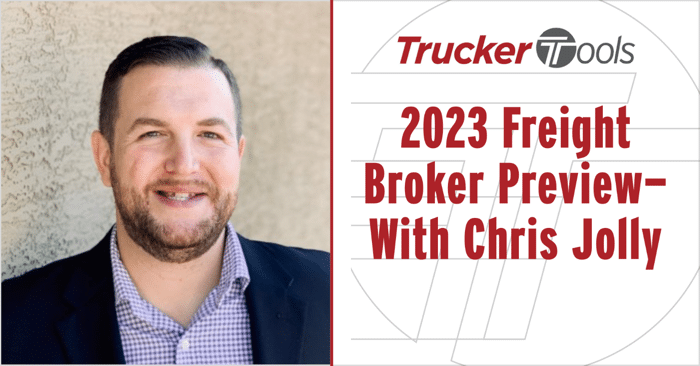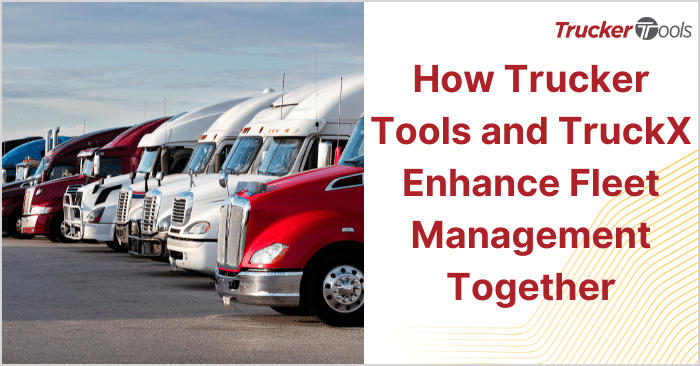As 2022 winds down, it’s the perfect time to preview what might be coming in 2023 and to review the highlights of the last year. We recently had the chance to catch up with Chris Jolly, aka The Freight Coach, to do just that. Chris is a freight broker turned consultant who has been around trucking and transportation his entire professional career. His dad was a trucker for more than 30 years and for the last 12 years Chris has held multiple positions in the logistics industry. His previous experience includes working as a carrier sales rep, sales manager and operations manager in logistics. Today Chris provides sales and operations consulting services to logistics providers, freight brokers and fleets.
2022: A Year in Review in Freight Brokerage
“This year started out being very lucrative for freight brokers and logistics companies,” Chris shared. “There was still a lot of uncertainty with the ports and that drove rates up in the full truckload world for the first half of the year. Then around late May or early June, things started to change. The spot market started to reduce and rates started to follow suit. A lot of that had to do with the fact that contracted rates for 2022 were very elevated. Spot market is overflow freight. It’s when people reject contracted freight and it goes out into the spot market. There was a lot of uncertainty with that aspect of the market because as the spot market started to go down, fuel started to skyrocket as well. To me, there’s no difference between this year and most years in transportation because there is always going to be uncertainty in freight. The anomaly of 2021 and the first half of 2022 was how long the rates stayed elevated — because we always knew the market shift was going to happen.”
According to Chris, winning and retaining customers over the last two years has been easier for brokers than it was before the pandemic began. Many shippers were willing to overlook service failures because of the lack of truck capacity and general uncertainty. All of these factors made 2022 on the whole a year of record earnings for freight brokers and 3PLs. Many brokers and logistics providers concentrated their technology investments in 2022 on automating manual tasks for their carrier reps, including load booking automation. These technology investments focused on removing the human element from processes that don’t necessarily require hands-on attention, which gave carrier reps the opportunity to focus more of their time on relationship-building.
What To Expect in Freight Brokerage in 2023
“Any time that you see uncertainty in the world, whether we’re talking about the overall U.S. economy or inflation in general, people make very reactive decisions in the moment,” Chris shared. “We’re already seeing layoffs and we’re already seeing mass exodus from some companies right now. Owners are looking at how to get more out of their current head counts. They want to invest in technology to get more output. Rest assured, if you’re a good employee you are going to have a job no matter what. In my personal opinion, as a freight broker 95 percent of my day should be automated. I should not be manually accepting load tenders. I should not be manually building a load. Each day, most of my efforts should be focused on outreach. It should be on earning that next shipment for my customer. Brokers shouldn’t be spending their time manually accepting tenders, building loads, calling facilities and verifying information. That stuff needs to be automated and streamlined. I just got a notification from Amazon that my package is five stops away. That takes a check call in this industry. That loss of productivity never shows up on a P&L sheet and that’s why it’s so hard for people to gauge what it actually costs your organization not to automate.”
As a freight broker, 95 percent of my day should be automated. I should not be manually accepting load tenders. I should not be manually building a load. Each day, most of my efforts should be focused on outreach. It should be on earning that next shipment for my customer.
Chris expects that 2023 will be a relatively normal year in freight brokerage, but with great opportunity for growth. Brokers who have invested in technology and automation will be equipped to capitalize on others’ service failures, the very same failures that were previously overlooked by shippers when capacity was tight. One critical mistake that Chris sees some brokers already making in this “broker’s market” is not focusing enough on service and carrier relationships.
“Anytime it shifts into a quote unquote broker’s market, which is what it seems like out there right now, there are more service failures than there ever are when capacity’s tight,” said Chris. “Some brokers want to hold out for an additional $100 on a load. They end up going with a driver who’s a backup option that results in a service failure. That service failure might happen an hour before pickup and then there are no more trucks in that market. You don’t have an excuse to fail on loads in a broker’s market because capacity’s loose in every market right now. That’s why I think there is so much opportunity out there right now — but if you’re going to nickel to dime carriers, you’re going to find yourself out of customers very quickly. You are nothing without your carrier partners. Your technology means nothing if you don’t have trucks to show up.”
To learn more about Chris, tune into his morning show on LinkedIn every weekday at 10:30 a.m. Central Time.
Read “Chris Jolly’s Tips for Building Relationships with Carriers.”






